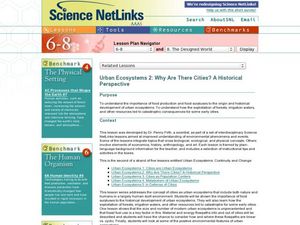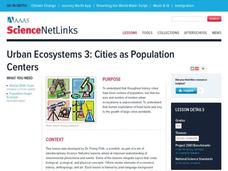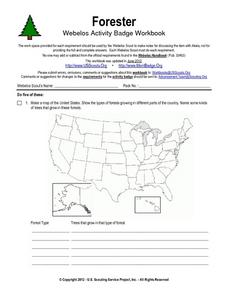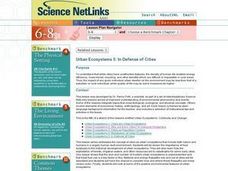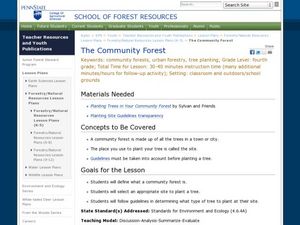Curated OER
Where the City Meets the Tree: Urban Forestry
Define the term "urban forestry"; discuss several problems facing urban forests today and both government and public efforts centered on developing and maintaining sustainable urban forests. Develop a feasible action plan for alternative...
Latin America Network Information Center
Urbanization
Brazil's population has been changing dramatically in the last century. Study the causes of Brazilian urbanization, including industrialization and and migration, and the implications for the country of the populations'...
Curated OER
Urban Ecosystems 2: Why Are There Cities? A Historical Perspective
Students investigate the importance of food surpluses to the historical development of urban ecosystems.
National Wildlife Federation
Quantifying Land Changes Over Time in Areas of Deforestation and Urbanization
Is qualitative or quantitative research more convincing when it comes to climate change? In the eighth lesson during this 21-part series, scholars begin by performing a quantitative analysis of deforestation and urbanization. Then, they...
KOG Ranger Program
Managing Forests to Prevent Wildfires
Sometimes the best way to prevent forest fires is to create smaller fires. Explore forest management with an activity that explains the ways that controlled burns can keep unexpected fires from running amok in the wilderness and nearby...
Curated OER
Urban Ecosystems 2: Why are There Cities? A Historical Perspective
Second in a series of five lessons, this lesson encourages preteens to consider cities as urban ecosystems. First, they keep a food diary for a few days. They visit the Natrional Agricultural Statistics Service website for current data...
Curated OER
Urban Ecosystems 3: Cities as Population Centers
Young scholars discover that throughout history cities have been centers of population but that human exploitation of fossil fuels was key to the growth of large cities worldwide. They research urban growth through a number of websites.
Curated OER
Forester
For this forester worksheet, students illustrate a map that shows the types of forests growing in various parts of the country. They also identify six forest trees common to the area where they live and explain how both wildlife and...
Curated OER
Urban Ecosystems 5: In Defense Of Cities
Students explain that while cities have unattractive features, the density of human life enables energy efficiency, mass transit, recycling, and other benefits which are difficult or impossible in rural areas. This is the fifth in an...
Curated OER
Urban Ecosystems 4: Metabolism of Urban Ecosystems
Cities are compared to living, breathing, metabolizing organisms. Fourth in a five-part series of lessons, this one focuses on the flow of materials through a city. Links to interesting websites and images make your delivery of...
Curated OER
From Forest to Farm to Urban Forest
Students participate in a group discuss revolving around urban development and their answers to worksheet questions. They analyze maps and historical records to compare and contrast the day to day activities of a forest manager.
Curated OER
Urban Ecosystems 4: Metabolism of Urban Ecosystems
Students discover that material and energy uses by a city come from outside the city boundaries. They realize that the pathway of these material is linear instead of cyclical as they are in natural ecosystems.
University of Florida
Six Bits of Abiotics
Collect clues and unwrap a mystery in an intriguing study about air pollution and urban forests. Teams share information to explore abiotic interactions and forest health. Scholars create a concept map using newly acquired knowledge and...
Curated OER
Introduction to Urban & Community Forestry: Why Do We Need Trees?
Twelfth graders construct a timeline to show changes and trends in the future of urban and community forestry. In this forestry lesson, 12th graders discuss the importance of trees. They read a timeline and add future events to show...
Curated OER
The Community Forest
Fourth graders plant a tree. In this sustainable forestry lesson, 4th graders define community forest and brainstorm a location to plant a new tree on the school grounds. Students learn how to plant a tree and discuss choosing an...
Curated OER
What is a National Forest
Students select and research a National Forest near their local community. They read and discuss the pamphlet "A Guide To Your National Forests," view photos of national forests, conduct Internet research, and complete the student...
Science 4 Inquiry
Deforestation
Young scientists observe deforestation from satellite photos and discuss the importance of forests to the global environment. They then simulate a plot of forest when farmers move into the area over the course of seven years. Finally,...
National Wildlife Federation
Quantifying Land Changes Over Time Using Landsat
"Humans have become a geologic agent comparable to erosion and [volcanic] eruptions ..." Paul J. Crutzen, a Nobel Prize-winning atmospheric chemist. Using Landsat imagery, scholars create a grid showing land use type, such as urban,...
Curated OER
Geography, Ecology, and Folklife
Students identify how do geography and ecology influence a region's folklife. Then they investigate this question and consider how an outsider might view their own region in this lesson. Students also identify how the natural world, even...
Curated OER
Communities
The study of types of communties is the focus of this presentation. Details are given about the differences between rural, urban, and suburban communities. Use this presentation to provoke a class discussion about the various activities...
Forest Foundation
Fire - How Does it Relate to You?
Forest fires can be a necessary step in keeping a forest healthy, but what happens when they get out of control? Learners investigate the causes and effects of forest fires in two specific areas, culminating in a report about the ways...
Curated OER
Optional Laboratory: Forest Volume Cruise
Young scholars examine the process in which to complete a forest volume cruise. They practice calculating the amount of lumber per acre of a given area. They share their results with the class.
Curated OER
Impervious Surfaces
Middle schoolers comprehend impervious surfaces. They recognize the problems caused by impervous surfaces. Students observe how land use can influence impervious surfaces. They chose four of the seven basic land surface, middle schoolers...
Curated OER
A Tree Is More than a Street Name
Eighth graders discuss the role of trees as one of the most important natural resources. In groups, they examine how the forests nearby helped to shape their urban city. Using the internet, they research the use of the forest in early...




